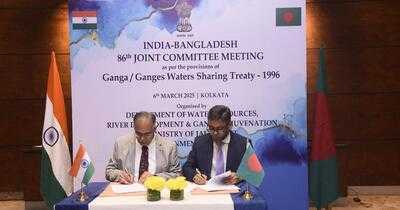

The Ganga Water Treaty is crucial to India-Bangladesh relations because it guarantees a systematic process for water sharing between the two riparian states.
The treaty, signed in 1996, expires next year.
It needs to be renewed in the interests of both India and Bangladesh. Preliminary being made to re-negotiate the treaty.
Although the Ganga Water Treaty has promoted collaboration, there are still issues, particularly with seasonal water scarcity and the requirement for a more comprehensive transboundary water-sharing structure. Both nations will need to negotiate a more thorough and
On December 12, 1996, then-Indian Prime Minister HD Deve Gowda and his Bangladeshi counterpart Prime Minister Sheikh Hasina signed the Ganga Water Treaty. The 30-year treaty will end in 2026.
In the last three decades, the treaty has been , especially by Bangladesh, which has often claimed that it was biased in India’s favour and has resulted in severe water shortages in Bangladesh.
Water allocation is determined using historical flow data from 1949 to 1988 during a 10-day period at Farakka Barrage in India. The average flow at the barrage during the dry season (January 1 to May 31), when water availability is critical, is the basis for the water-sharing formula of the treaty.
The treaty enjoins Bangladesh and India to split the water supply...